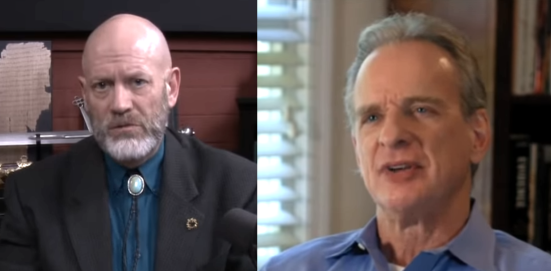Podcast: Play in new window | Download
Subscribe: Spotify | Email | RSS

In this episode I interact with a short video by Dr. William Lane Craig, and with a critique of it by Dr. James White.
You’ll learn what they have in common as apologists, as well as what separates them. You’ll hear Dr. White distinguish between two things which might be meant by calling the Trinity “essential.”
I explain why in my view “the Trinity” isn’t essential in either sense.
I also explain why White’s work is perennially popular with the laity, and also why scholars investigating the meaning and justification for “the Trinity” always ignore it.
Who do you most agree with on this topic: Dr. Craig, Dr. White, or me?
Links for this episode:

- Daniel 7:13-14, Psalm 110:1; Revelation 5:1-14; Philippians 2:9-11
- Is the Trinity Essential? And Much More
- Is the Doctrine of the Trinity Essential?
- podcast 265 – What apologists don’t understand about the terms “being” and “Person”
- Brown vs. White on the Trinity
- Some overviews of the clashing Trinity theories: Stanford, Internet, Routledge.
- What is essential to the gospel, according to Luke? Part 1
- What is the Trinity?
- How Trinity theories conflict with the New Testament
- podcast 248 – How Trinity theories conflict with the Bible
- podcast 257 – A letter from the Lord Jesus: About God and Me
- podcast 227 – Who Should Christians Worship?
- Larry Hurtado on early Christians’ worship of Jesus
- Hurtado on the early worship of Jesus
- The Lost Early History of Unitarian Christian Theology
- Tuggy vs. Date debate
- podcast 260 – How to Argue that the Bible is Trinitarian
- podcast 53 – John Locke’s The Reasonableness of Christianity, Part 2
- podcast 52 – John Locke’s The Reasonableness of Christianity, Part 1
- podcast 85 – Heretic! Four Approaches to Dropping H-Bombs
- podcast 26 – Pastor Sean Finnegan on “the Holy Spirit” – Part 2
- podcast 25 – Pastor Sean Finnegan on “the Holy Spirit” – Part 1
- podcast 124 – a challenge to “Jesus is God” apologists
- This week’s thinking music is “Great Expectations” by Kai Engel.

Yes trinity is essential and the unitarian perspective of philippians 2:6-7 is questionable
Moses spent 40 days and nights on Mt Sinai receiving the law and other instructions from God yet he failed to notice that God is three in one. Perhaps Moses is one who ‘holds error out of ignorance’ as Dr White describes many of us. It is so sad Dr White feels he cannot have fellowship with Unitarians. An incomprehensible doctrine which he knows most Christians don’t understand seems more important to him than what unites us: We believe Jesus is the Messiah.
Loved your note that the doctrine of the Trinity is a means by which Christians distinguish themselves from Jews and Muslims. Besides satisfying the normal human desire for exclusivity and a well-defined identity, I think this trails back to popular Christian visions of salvation. For Christians, God saves sinners (through the death of a sinless divine being). Yet for Jews and Muslims, sinners save themselves through righteous deeds (according to evangelical thinking). Dr. Craig makes clear that the intricacies of the Trinity are not of actual importance as long as God somehow dies on the cross for sins and in so doing justifies justification by faith.
Basically I think Trinitarians cannot accept the idea of a sinless man unless that man is God, and they cannot believe in the beloved evangelical substitutionary model of atonement unless there is a sinless sacrifice. Non-Trinitarians need to question either the popular model of atonement or the Biblical validity of the proposition that no normal human being can be sinless. Both represent promising avenues of inquiry.
Comments are closed.